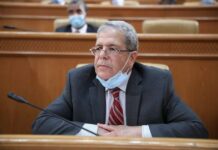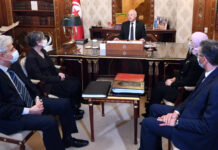
A marked change in Ennahda‘s speech, between the evening of July 25, in which the movement’s president spoke of the “coup d’état of the President of the Republic on the Constitution”, and its statement issued on 12 August, in which it announced the formation of a committee to manage the political crisis, recognizing the state of inertia in which the country was and therefore its intention to “make concessions”.
A Calming Speech, however…
A number of Ennahda associates consider the latest statement issued on Thursday, 12Th Of 2021, an “important turning point” as a calming tone away from the calls for confrontation and alien power that the movement’s leader Rashid Ghannouchi launched through American, British and Turkish media in recent days.
In this regard, sources close to the movement tell JDD Tunisia, that the current leadership of Ennahda began to absorb what happened and appreciate the reality of its size on the field and therefore retreated a step backwards to give itself a chance to adapt and position in the new scene, pointing out that the statement reflects the differences of opinions and trends within it because it also included a veiled threat besides calming down in order to satisfy a slit still committed to the first position.
Another point of view from within Ennahda is that the committee proposed by Rachid Ghannouchi to “manage the crisis” is a bridge that does not lead to the opposite side, considering that its members “have no weight” inside and outside the movement and their faces are unknown and part of them relate to names that Tunisians refuse to adopt a dispavulsive and convulsive speech within parliament and in the media and have tense relations with national organizations and other components of the political scene, which will be an obstacle to this committee, according to the same sources.
Ennahda gives up.
Obaid al-Khelaifi, a researcher at the University of Tunisia, who specializes in jihadist movements and political Islam, told JDD Tunisia that Ennahda‘s statement was all in the form of the report, not demanding and appealing in a kind of arrogance and denial, but raising the white flag in front of the movement of history, he said.
“Ennahda‘s crisis appears to have reached its peak in its latest statement, and it is ready to make all political concessions in order to maintain its existence and not to open judicial files condemning it in the ambassadorship, funding, assassinations and the secret service,” al-Khelaifi said, adding that it is now living in societal isolation and political isolation with lack of regional and international support.
He stressed that the movement wants a road map to go back to regain its political role in the country, expressing its support for President Qais Saied in fighting corruption and prosecuting the corrupt, but not to be concerned with this step, and expressed its intention to change the leadership if Said interacts with her positively, which is a surrender to the post-July 25 fait accompli, in which there is no talk of constitutional legitimacy or popular legitimacy.
Rifi-JDD










